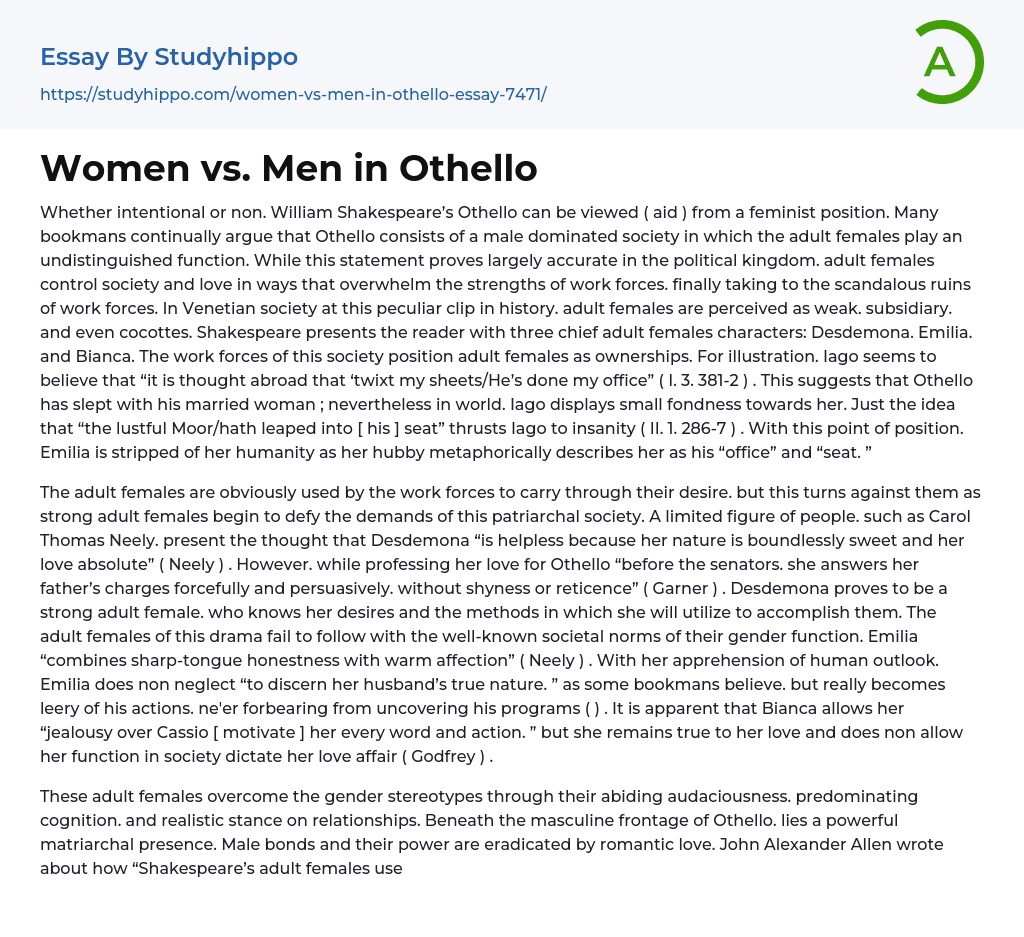William Shakespeare's play Othello can be analyzed from a feminist perspective, whether intentionally or not. Many scholars argue that the play portrays a society dominated by men, where women are relegated to insignificant roles. While this holds true in the political sphere, women actually exert control over society and love in ways that overpower men, ultimately leading to their downfall. In Venetian society during this time period, women are perceived as weak, subservient, and even seen as prostitutes. Shakespeare presents three main female characters: Desdemona, Emilia, and Bianca. Men in this society view women as possessions; for instance, Iago believes that Othello has slept with his wife and refers to her as his "office" and "seat." However, it becomes evident that Iago harbors little affection for her. The women are clearly used by men to fulfill their desires but this ultimately backf
...ires as strong-willed women start resisting the demands of patriarchal society. Only a few individuals like Carol Thomas Neely recognize the significance of women's resistance in the play. Desdemona is depicted as gentle and loving which makes her vulnerable; however, she confidently defends herself against her father's accusations and proves herself to be a strong woman who does not conform to societal norms. Emilia is both honest and affectionate; she sees through her husband's true natureDespite being jealous, Bianca remains true to her love and refuses to let societal expectations dictate her actions. These women challenge gender stereotypes through their bravery, knowledge, and realistic approach to relationships. Despite Othello's masculine facade, there is a strong presence of matriarchy. Shakespeare's female characters are able to use and control gender while his male characters cannot. The
workforces in Othello easily succumb to their emotions due to ignorance and confusion throughout the play, whereas the women maintain their faith in love. In a male-dominated society, there are dangers, inequalities, defeats, and limitations that cause the women to adapt by maintaining a rational mindset in their relationships (Allen). While most critics focus on the relationship between Othello and Iago (Garner), a closer examination of Othello's mind reveals his wife Desdemona's immense power over him.Othello becomes weakened by grief when he believes Desdemona has been unfaithful.Although many portray the men in this play as embodiments of bravery,honor,and power,Othello's strength is jeopardized by his inability to control his emotions(Allen). Garner agrees that once Othello's jealousy and anger surface,Desdemona's honesty and bravery begin fading away(Garner).However,in spite of her murder attempt.Desdemona maintains her virtue and honesty as she continues upholding her marriage vows.Neely asserts that in Othello, Emilia's insight undermines Iago's bond with Othello, showcasing the triumph of female intuition and logic over male misconceptions of passion. The consequences faced by each man highlight the overarching romantic superiority of women. Unlike their male counterparts, the female characters exhibit trustworthy behavior devoid of covetousness. Through her portrayal, Neely effectively demonstrates how women like Bianca and Desdemona love sincerely while upholding moral standards and respecting their husbands. Throughout the play, men obsess over reputation at the expense of their sanity, often blaming those beneath them for their own actions. In contrast, women lack this class consciousness dominating men's minds and instead stand up for one another despite societal roles. Despite these powerful actions by women, it is undeniable that men dominate both politically and militarily in Venetian society. Scholars
argue that Othello and Iago assert authority through hidden power dynamics as they hold positions of power within society and families.According to Neely, men view uneducated women as objects and believe that they are unable to attain the same level of knowledge and eloquence as characters like Othello. Neely also argues that critics who hold this traditional perspective often belittle female characters like Desdemona in the play. (Neely)
- Othello Jealousy essays
- A Doll's House essays
- A Midsummer Night's Dream essays
- A raisin in the sun essays
- A Streetcar Named Desire essays
- An Inspector Calls essays
- Death of a salesman essays
- Everyman essays
- Fences essays
- Hamlet essays
- Hedda Gabler essays
- Iago essays
- King Lear essays
- Macbeth essays
- Much ado about nothing essays
- Oedipus Rex essays
- Oedipus The King essays
- Othello essays
- Pygmalion essays
- Romeo And Juliet essays
- Tartuffe essays
- The glass menagerie essays
- The Importance of Being Earnest essays
- The Merchant Of Venice essays
- The Taming of The Shrew essays
- Twelfth Night essays
- Waiting For Godot essays




